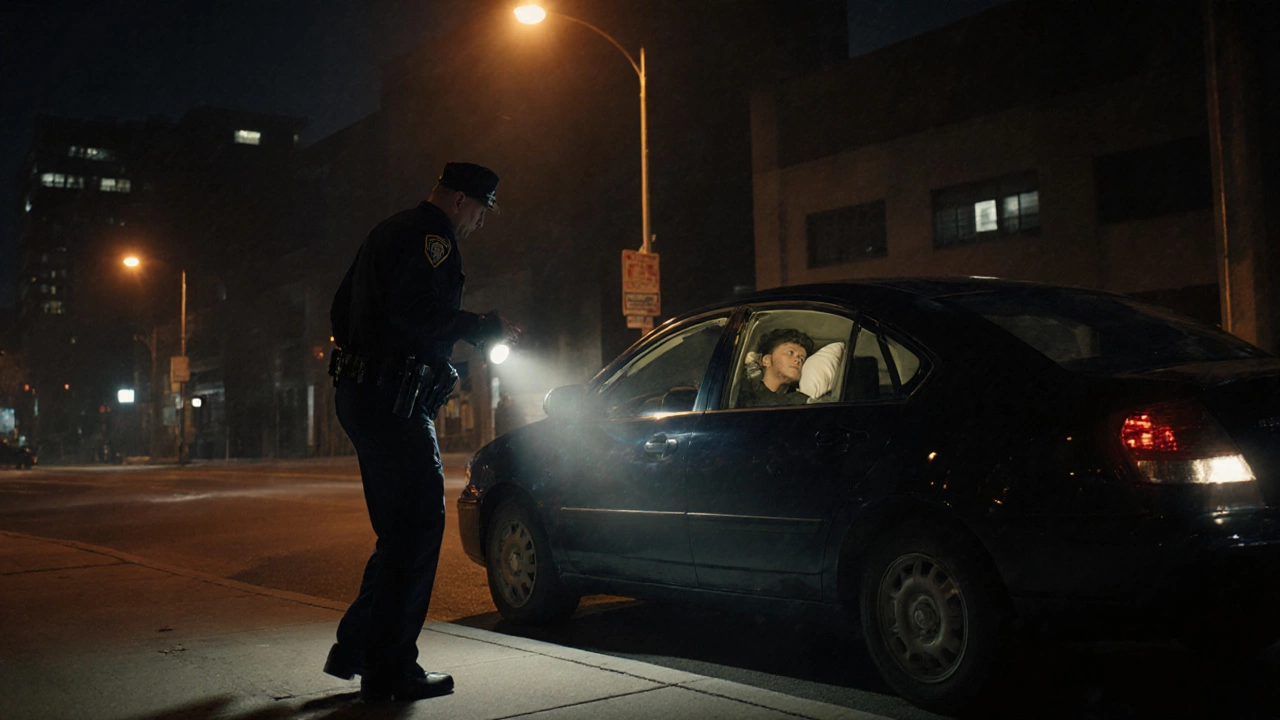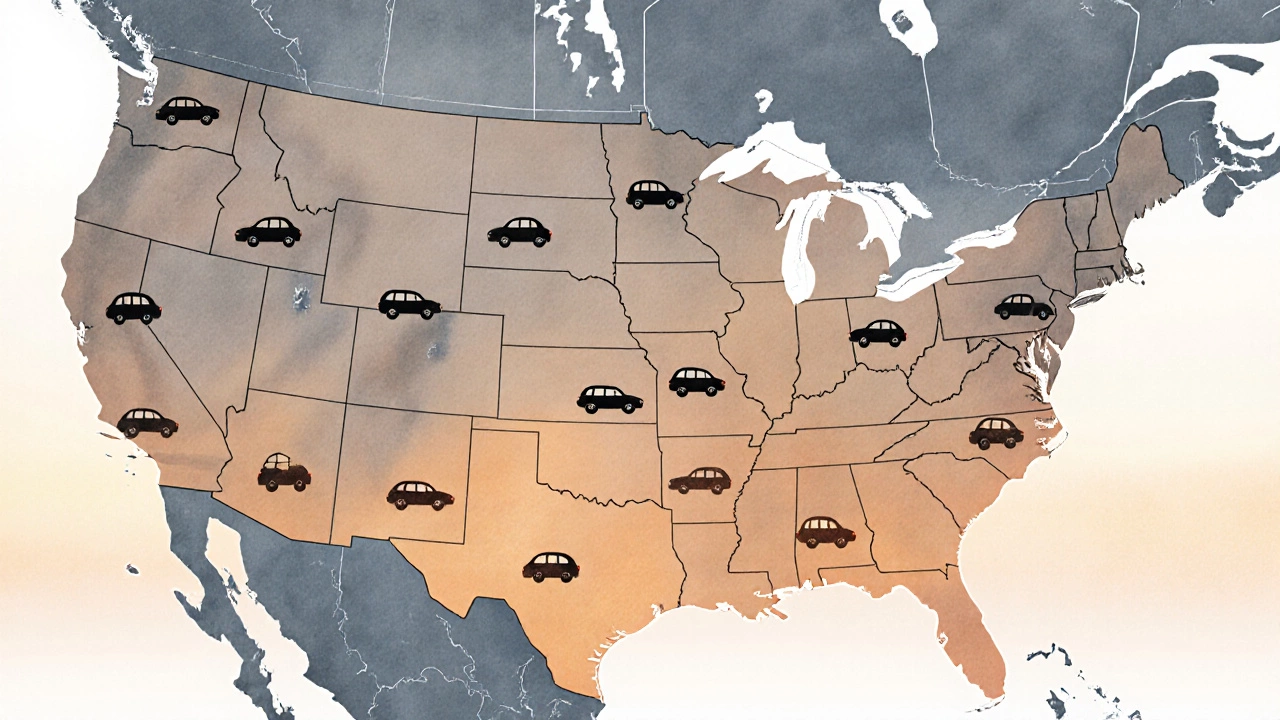Car Sleeping Law Checker
Find Out If You Can Sleep in Your Car
Select your state to see if sleeping in your car is legal and learn about penalties, exceptions, and safe parking options.
Ever wondered if you can pull over and catch some shut-eye without getting a ticket? The short answer is: it depends on where you are. In the United States, each state writes its own rules about car sleeping laws, and they range from permissive to downright prohibitive. This guide breaks down the most common restrictions, highlights the states that explicitly outlaw sleeping in a vehicle, and offers practical tips to stay on the right side of the law.
What Exactly Counts as “Sleeping in Your Car”?
Car sleeping laws are regulations that determine whether you can legally rest or sleep inside a vehicle while parked in public or private spaces typically apply when you are inside the vehicle for more than a brief stop - that is, you intend to spend the night or a significant portion of it. The key factors courts look at are:
- Duration of stay (usually more than 8‑12 hours)
- Purpose of the parking (rest vs. loitering)
- Location (public street, rest area, private lot, etc.)
If you meet these criteria, local ordinances may treat you like any other overnight occupant, subjecting you to the same rules that apply to campers or homeless individuals.
Why Some States Have Made It Illegal
States that ban car sleeping often cite public safety, traffic flow, and community standards. A common argument is that parked cars can become de‑facto shelters, which may attract crime or create sanitation concerns. In addition, some municipalities want to protect local businesses that rely on short‑term parking turnover.
These policies intersect with broader Homelessness the condition of lacking stable, safe, and adequate housing issues. Critics say that criminalizing vehicle rest amplifies the hardships faced by people experiencing homelessness, while supporters claim the rules keep streets orderly.
States That Explicitly Prohibit Sleeping in a Car (2025)
The following states have statutes, city ordinances, or court rulings that make it illegal to sleep in your vehicle on public property without permission. The list isn’t exhaustive-many counties and cities have their own rules-but these states have statewide or widely enforced local laws as of October 2025.
| State | Legal Status | Typical Penalty | Common Exceptions |
|---|---|---|---|
| California | Generally prohibited on public streets; some cities allow overnight parking in designated zones | $50‑$500 fine; possible towing | Rest areas of California Department of Transportation, private property with owner consent |
| Texas | State law bans sleeping in a vehicle on state‑maintained highways and most city streets | $100‑$200 fine; vehicle may be impounded for 24‑48 hours | Truck stops, commercial parking lots, designated “overnight parking” areas |
| Florida | Local ordinances in many municipalities classify vehicle sleeping as a misdemeanor | Up to $500 fine; community service | Rest areas, private campgrounds that permit vehicles |
| New York | NYC and several upstate cities prohibit sleeping in vehicles on public streets | $100 fine; possible towing | Designated “safe parking” sites run by nonprofits, private property |
| Illinois | Chicago ordinance makes it illegal to sleep in a vehicle on public streets | $100‑$300 fine; vehicle may be released after a day | Rest areas of Illinois Tollway, private lots with permission |
Even in states without a statewide ban, dozens of cities enforce their own rules. For instance, Minneapolis (Minnesota) and Portland (Oregon) have local codes that prohibit overnight parking in residential zones.

How Penalties Are Enforced
Law enforcement typically follows a three‑step process:
- Observation: An officer spots a vehicle that appears to be occupied for an extended period.
- Warning: In many jurisdictions, the driver receives a verbal warning and a chance to move the car.
- Citation or Tow: If the driver stays, a citation is issued or the vehicle is towed to a municipal lot.
Some areas issue a “civil penalty” rather than a criminal charge, meaning the fine is payable without a courtroom appearance. However, repeated offenses can lead to misdemeanor charges, especially if the vehicle is deemed a public nuisance.
Where You Can Legally Rest Overnight
If you need a safe place to sleep, consider these options that usually fall outside the scope of car‑sleep bans:
- Rest areas managed by state transportation departments-most allow 24‑hour parking for travelers.
- Truck stops and travel centers-many provide dedicated parking bays for cars and RVs.
- Public parks-some national or state parks permit overnight vehicle parking with a permit.
- Commercial lots-shopping centers, stadiums, or hospitals sometimes allow overnight stays if you get permission.
- Safe‑parking programs run by NGOs and local governments-these are designed for people experiencing homelessness and often provide access to showers and social services.
Always look for signage indicating “overnight parking allowed” or ask a manager before settling in for the night.
Resources for Navigating the Legal Landscape
When you’re caught in a legal gray area, these resources can help:
- Legal aid organizations-many provide free counsel on housing‑related offenses. Check out the National Legal Aid & Defender Association (NLADA) directory.
- American Civil Liberties Union (ACLU)-the ACLU frequently litigates against punitive car‑sleep statutes and publishes guides on your rights.
- Local homeless shelters-even if you’re not a shelter client, many have “drop‑in” hours and can point you to safe‑parking sites.
- State department of transportation websites-they list official rest‑area locations and any overnight parking restrictions.
Knowing your rights before you’re stopped can make the difference between a quick warning and a costly citation.

Tips to Avoid Fines While Traveling
- Plan your route around recognized rest areas. Use apps like AllStays or iExit to locate legal overnight spots.
- When in doubt, park in a well‑lit commercial lot and ask the manager if overnight parking is allowed.
- Avoid residential streets after dark; many cities enforce stricter rules in those zones.
- Keep windows slightly open for ventilation, but don’t leave the car visibly occupied for hours without moving.
- If you’re forced to stop on a street, set an alarm to move the car within the local time limit (often 2‑4 hours).
These habits keep you safe, respect local communities, and save you from unexpected fines.
Mini‑FAQ
Is it ever legal to sleep in my car on a public street?
Only in states or cities that have no specific ordinance against it, and usually only for a short period (often 2‑4 hours). Most jurisdictions require you to move after that window.
What should I do if I get a ticket for sleeping in my car?
Check the citation for the exact violation code. You can often contest it in traffic court or negotiate a reduced fine, especially if you can prove you were a traveler needing rest.
Do rest areas ever have restrictions on overnight parking?
Yes. Some states limit rest‑area stays to 24 hours or require you to move after a certain number of hours. Always read the posted signs.
Can I use a truck stop’s parking lot for a night?
Most truck stops welcome car travelers and allow overnight parking for free or a small fee. Just follow any posted rules and keep the area clean.
Are there any federal laws that prevent car sleeping?
No. The United States has no federal statute outright banning sleeping in a vehicle. All regulations are set at the state, county, or city level.
Next Steps If You’re Facing a Car‑Sleeping Citation
1. Document the scene: Take photos of the signage, the location, and the time.
2. Contact legal aid within 7 days-many groups have rapid‑response teams for traffic‑related cases.
3. Consider alternative safe‑parking options for future trips to avoid repeat citations.
Staying informed about the local rules not only protects your wallet but also helps you travel responsibly across the country.
